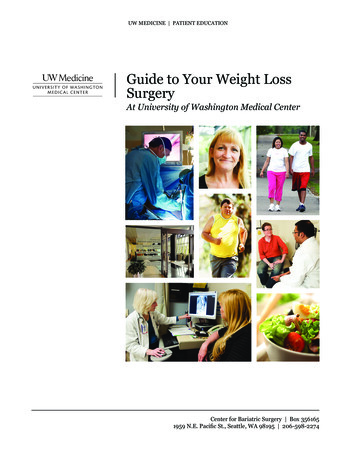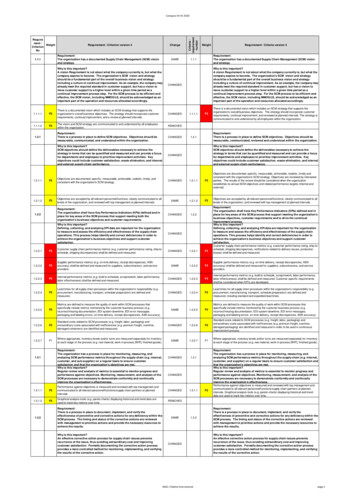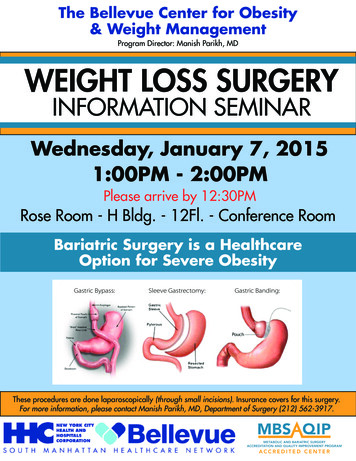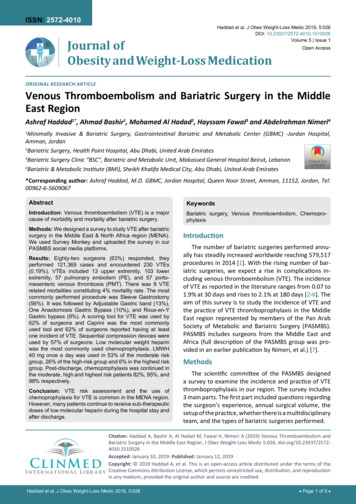
Transcription
UW MEDICINE PATIENT EDUCATIONGuide to Your Weight LossSurgeryAt University of Washington Medical CenterCenter for Bariatric Surgery Box 3561651959 N.E. Pacific St., Seattle, WA 98195 206-598-2274
UW MEDICINE PATIENT EDUCATION Table of Contents Guide to Your Weight Loss SurgerySections1.Welcome2.Your Health Care Team3.Weight Loss Surgery4.Getting Started5.Preparing for Surgery6.Day of Surgery7.Your Hospital Stay8.Going Home9.Follow-up10. Lifestyle and Diet Changes11. Physical and Occupational Therapy Exercises12. Recipes and Diet Suggestions13. Online Resources14. Bariatric DiaryPage iTable of Contents Guide to Your Weight Loss SurgeryCenter for Bariatric Surgery Box 356165 1959 N.E. Pacific St., Seattle, WA 98195 206-598-2274
UW MEDICINE PATIENT EDUCATION Welcome For patients having weight loss surgery atUniversity of Washington Medical Center (UWMC)Bariatrics is the branch of medicine that deals with the causesand treatment of obesity. UWMC is nationally recognized as aCenter of Excellence for Bariatric Surgery since 2006.Welcome to UWMC’s Bariatric Surgery Program. Thank you forchoosing us for your weight loss surgery. Our bariatric surgery team islooking forward to working with you and your family.You are a vital member ofthe bariatric team. Wedepend on you to be anactive partner throughoutyour bariatric surgeryprocess. We want you tolearn all you can about theevaluation process, the typeof bariatric surgery you willhave, and the adjustmentsyou will need to make to besuccessful after surgery.You are a vital member of the bariatricteam. We depend on you to be an activepartner throughout your bariatric surgeryprocess.This manual, Guide toYour Weight Loss Surgery,was created to help youbecome an active member of your team. It is filled with usefulinformation to guide you through each step of the bariatric surgeryprocess, from being referred by your primary care provider to long-termcare after surgery. We hope it answers the many questions you may haveabout your treatment and progress along the way. Keep this guidehandy, and bring it with you to all appointments, including the day ofsurgery and your follow-up visits.Thank you again for choosing University of Washington Medical Center.Page 1Welcome Guide to Your Weight Loss SurgeryCenter for Bariatric Surgery Box 356165 1959 N.E. Pacific St., Seattle, WA 98195 206-598-2274
Questions?Your questions are important.Call your doctor or healthcare provider if you havequestions or concerns.UWMC clinic staff are alsoavailable to help.Center for Bariatric Surgery:206-598-2274 University of Washington Medical CenterPublished PFES: 09/20102, 07/2013Clinician Review: 07/2013Reprints on Health Online:https://healthonline.washington.eduPage 2Welcome Guide to Your Weight Loss SurgeryCenter for Bariatric Surgery Box 356165 1959 N.E. Pacific St., Seattle, WA 98195 206-598-2274
UW MEDICINE PATIENT EDUCATION Your Health Care Team For patients having weight loss surgeryThis section of the Guide to Your Weight Loss Surgery containsinformation about the health care providers who will be caring for youbefore, during, and after your surgery.Your health care team at University of Washington Medical Centerwants your surgery and recovery to be successful. We will do everythingpossible to help you succeed. But you must also: Follow the plan we advise for you Let us know right away when you are having any problems Keep your clinic appointmentsPatients who follow up withus on a regular basis havethe most success afterweight loss surgery. If, atany time in the future youstart to have problems suchas weight gain or nauseaand vomiting, make sure toschedule an appointmentwith your surgeon or nursepractitioner to talk aboutyour problem and get youback on track. We want thebest for our patients!Patients who follow up with us on aregular basis have the most successafter weight loss surgery.Members of Your TeamWhile you are at the Surgical Specialties Center, you will meet thesemembers of your health care team:Bariatric SurgeonYou will see your surgeon at your first clinic visit, before your surgery,during your hospital stay after surgery, and at your early follow-up visits.Nurse PractitionerThe nurse practitioner works closely with the other members of yourhealth care team to provide care before and after surgery. You may meetPage 3Your Health Care Team Guide to Your Weight Loss SurgeryCenter for Bariatric Surgery Box 356165 1959 N.E. Pacific St., Seattle, WA 98195 206-598-2274
your nurse practitioner at your pre-surgery visit. During this visit, you willhave a physical exam and review the results of the tests your surgeonordered at your first clinic visit.After surgery, your nurse practitioner will see you for many of your clinicvisits, gastric band adjustments, and annual checkups.Surgical Residents, Fellows, and Medical StudentsThese doctors and students are trained by your surgeons. They will providesome of your care.DietitianA dietitian promotes healthy eating and long-term behavior changes that willhelp you reach and maintain your desired weight. You and your dietitian willmeet before surgery to discuss your meal plans. Your dietitian will help youprepare for your surgery and for the lifestyle changes you will need to make.After surgery, your dietitian will meet with you at your clinic visits to helpyou get started on your new diet. Your dietitian will help you avoid problemswith eating and food, and will develop a food plan that is right for you.Social WorkerYour social worker will meet with you during the assessment process to learnabout your social situation, support system, substance abuse history, mentalhealth issues, and eating behaviors. Your social worker will use thisinformation to help you prepare for surgery and make the lifestyle changesyou will need to put in place before surgery.Registered NursesYour nurse is another resource for you. Your nurse will help you prepare forsurgery, talk with you about what to expect after surgery, and help youidentify the lifestyle changes you will need to make to ensure that yoursurgery is a long-term success.Questions?Your questions areimportant. Call your doctoror health care provider ifyou have questions orconcerns. UWMC clinicstaff are also available tohelp.Center for BariatricSurgery: 206-598-2274If you have any questions or concerns, call Surgical Specialties weekdaysfrom 8 a.m. to 5 p.m., at 206-598-2274. Ask to speak with the bariatricnurse.Patient Care CoordinatorThe patient care coordinator (PCC) for bariatric surgery schedules patientappointments such as the pre-anesthesia visit, checks insurance benefits, andauthorizes and schedules surgeries.Patient Services SpecialistThe patient services specialist (PSS) for bariatric surgery schedules patientsfor the bariatric seminar, new patient appointments, and all follow-up visitsafter surgery. University of Washington Medical CenterPublished PFES: 09/20102, 07/2013Clinician Review: 07/2013Reprints on Health Online: https://healthonline.washington.eduPage 4Your Health Care Team Guide to Your Weight Loss SurgeryCenter for Bariatric Surgery Box 356165 1959 N.E. Pacific St., Seattle, WA 98195 206-598-2274
UW MEDICINE PATIENT EDUCATION Weight Loss SurgeryDivided proximal roux-y-gastric bypass, laparoscopic adjustablegastric banding, and laparoscopic sleeve gastrectomy.This section of the Guide to Your Weight Loss Surgery explains the typesof weight loss surgery that are done at UWMC. It also includes thebenefits and risks of each type.What is bariatric surgery?UWMC offers 3 types of weight losssurgery. They are: Divided proximal roux-y gastricbypass (RYGB) Laparoscopic adjustable gastricbanding (LAGB) Laparoscopic sleeve gastrectomy(LSG)Gastric Bypass SurgeryDivided proximal roux-y gastric bypass(RYGB), also called gastric bypass surgery,divides the stomach into 2 sections:Your weight loss surgerywill be done in the SurgicalSpecialties Center. The small section, called the “pouch,”is connected to your small intestine.The pouch becomes your new smaller stomach. It limits the amount offood you can eat easily. The large section of your stomach, called the “remnant stomach,” willstay in place, but your body will not use it.Compared to other bariatric procedures, RYGB results in: Quicker improvement in blood sugar control (for people with diabetes) Quicker decrease in symptoms of gastric reflux Greater average weight lossRYGB surgery bypasses about 90% of the stomach, so only 10% holdsfood. A 3-foot to 5-foot length of intestine is connected from the smallstomach pouch to the rest of the intestines. Another 9 to 15 feet ofintestines is still used to digest and absorb food from the small stomachpouch.Page 5Weight Loss Surgery Guide to Your Weight Loss SurgeryCenter for Bariatric Surgery Box 356165 1959 N.E. Pacific St., Seattle, WA 98195 206-598-2274
Because the smaller stomach holds less food, this surgery helps you feelfull more quickly – but you must still eat less to lose weight.Divided proximal roux-y gastric bypass (RYGB)Laparoscopic or Open Surgery?Laparoscopic SurgeryMost bariatric surgeries are done using a device called a laparoscope. Alaparoscope consists of a camera that guides small instruments that gointo the abdomen through several narrow tubes or ports. The surgeon’shands do not go inside the abdomen. In this surgery, 4 to 5 smallincisions are made, instead of 1 large incision.Compared to open some of the benefits of laparoscopic surgery are: Fewer wound problems, such as infection and hernias Less pain after the first week Shorter hospital stay and quicker recovery Quick return of bowel function Fewer heart and lung problemsYour surgeon will determine whether a laparoscopic operation is bestfor you.Page 6Weight Loss Surgery Guide to Your Weight Loss SurgeryCenter for Bariatric Surgery Box 356165 1959 N.E. Pacific St., Seattle, WA 98195 206-598-2274
Open SurgeryIf your surgeon believes that laparoscopic surgery is not possible, an openoperation will be done. In this surgery, an 8-inch to 12-inch incision ismade down the middle of the abdomen (near the breastbone) to the bellybutton.Sleeve GastrectomySleeve gastrectomy (also called vertical sleeve gastrectomy) is anothertype of weight loss surgery.In this surgery, 85% to 90% of the stomach is permanently removed bystapling and dividing it vertically. The stomach that is left is in the shapeof a slim banana or a sleeve (see drawing below).Removing a large part of the stomach reduces the amount of food you caneat. It may also affect the hormone called ghrelin that controls appetite.Sleeve gastrectomyWeight loss with a sleeve gastrectomy is quicker than with a laparoscopicadjustable gastric banding (LAGB) but slower than with RYGB. As withthe other surgeries, you must eat less to lose weight. Expected weight losswith a sleeve gastrectomy may be less than a gastric bypass and more thana gastric banding surgery.Page 7Weight Loss Surgery Guide to Your Weight Loss SurgeryCenter for Bariatric Surgery Box 356165 1959 N.E. Pacific St., Seattle, WA 98195 206-598-2274
Laparoscopic Adjustable Gastric Banding (LAGB)In laparoscopic adjustable gastric banding (LAGB), also called “lap band,”an adjustable band is placed around the top part of your stomach. Thisband is connected to a small port and tubing (see drawing below). These areplaced under the skin of your abdomen.A syringe and needle are used to fill the port with water or saline, or toempty it to adjust the size of the band, as needed. Adjusting the bandcreates a feeling of restriction and fullness. This helps you control yourhunger and how much you can eat.After LAGB surgery, you will need to be closely monitored by the Center forBariatric Surgery team for the rest of your life. At your clinic visits, the portmay be filled or emptied to adjust the band to the right size.The band will help with weight loss, but you must also eat less and exerciseto lose weight. People who have the most success with the lap band arethose who are able to exercise and have had success in the past with dieting.Comparing Lap Band, Gastric Bypass, and Gastric SleeveSurgeries Weight loss with a lap band is slower than with gastric bypass and gastricsleeve surgery. Lap band patients lose about 30% to 50% less weight than bypasspatients. Lap band placement is a shorter surgery and has fewer risks than agastric bypass.The lap band systemand port are placedduring laparoscopicadjustable gastricbanding, also called“lap-band” surgery.Page 8Weight Loss Surgery Guide to Your Weight Loss SurgeryCenter for Bariatric Surgery Box 356165 1959 N.E. Pacific St., Seattle, WA 98195 206-598-2274
What are the risks?All surgeries have risks. Your risks with weight loss surgery will dependon your age and other health problems.Risks for the Open or Laparoscopic Gastric Bypass Death: 0.5% to 3% (1 to 6 patients out of 200) Leak where the stomach and/or bowel are connected: 1% to 5%(1 to 5 patients out of 100) Bleeding: 1% to 5% (1 to 5 patients out of 100) Blood clot in the lungs: 0.5% to 1% (1 or fewer patients out of 100) Bowel blockage or obstruction: 5% to 10% (5 to 10 patients out of 100) Need for re-operation: 10% (10 patients out of 100) Laparoscopic bypass:– Wound infection: less than 2% (fewer than 2 patients out of 100)– Incisional hernia: less than 2% (fewer than 2 patients out of 100) Open bypass:– Wound infection: 10% to 20% (10 to 20 patients out of 100)– Incisional hernia: 10% to 23% (10 to 23 patients out of 100)Risks for the Vertical Sleeve Gastrectomy Death: 0.1% (1 or fewer patients out of 100) Leak from stomach: 1% to 3% (1 to 3 patients out of 100) Bleeding: 1% to 2% (1 to 2 patients out of 100) Infection: 1% to 2% (1 to 2 patients out of 100) Blood clot in the lungs: 0.5% to 1% (1 or fewer patients out of 100) Need for re-operation: 1% to 5% (1-5 patients out of 100) Increased acid reflux: 10% (10 patients out of 100) Trouble swallowing or stricture (narrowing of the remaining stomach:5% (5 patients out of 100) Increased acid reflux (heartburn)Page 9Weight Loss Surgery Guide to Your Weight Loss SurgeryCenter for Bariatric Surgery Box 356165 1959 N.E. Pacific St., Seattle, WA 98195 206-598-2274
Risks for the Laparoscopic Adjustable Gastric Band(Lap-Band) Death: 0.05% to 0.1% (1 or fewer patients out of 100) Band erosion: 1% to 3% (1 to 3 patients out of 100) Band slipping: about 5% (about 5 patients out of 100) Port site infection: about 2% (about 2 patients out of 100) Blood clot in the lungs: 0.5% to 1% (1 or fewer patients out of 100) Need for re-operation: 30% (30 patients out of 100) Failure to lose the desired amount of weight.What You Need to Know Gastric bypass surgery and vertical sleeve gastrectomy surgerycannot be reversed. Total weight loss for each surgery varies. Of the 3 options, expectthe least amount of weight loss with lap band surgery. After any weight loss surgery:– You will need to take vitamin and nutritional supplements for therest of your life.– You may be more sensitive to alcohol.– If you are a woman, you have a greater chance for unplannedpregnancy and for problems with pregnancy in the first year aftersurgery.Illustrations in this handout are copyrighted by and used withpermission from Johnson & Johnson Services, Inc.Questions?Your questions are important.Call your doctor or healthcare provider if you havequestions or concerns.UWMC clinic staff are alsoavailable to help.Center for Bariatric Surgery:206-598-2274 University of Washington Medical CenterPublished PFES: 09/2010, 07/2013Clinician Review: 07/2013Reprints on Health Online:https://healthonline.washington.eduPage 10Weight Loss Surgery Guide to Your Weight Loss SurgeryCenter for Bariatric Surgery Box 356165 1959 N.E. Pacific St., Seattle, WA 98195 206-598-2274
UW MEDICINE PATIENT EDUCATION Getting StartedFor candidates for weight loss surgeryThis section of the Guide to Your Weight Loss Surgery explains thereferral process, medical and insurance criteria, expected costs, andwhat will happen at your first and second clinic visits at University ofWashington Medical Center (UWMC).Bariatric Surgery SeminarIf you are thinking about havingweight loss surgery, we inviteyou to attend a Bariatric SurgerySeminar. This seminar willprovide you and your familywith basic information aboutweight loss surgery. The goal ofthe seminar is to help you makean informed medical decision.Referral ProcessYour primary care provider (PCP)must refer you for this surgery.To begin the referral process:Bariatric Surgery is part of theSurgical Specialties Clinic at UWMC. You or your PCP should call UWMC’s Surgical Specialties Clinic’sintake line at 206-598-2274. You or your provider will leave your contact information and request abariatric surgical screening phone call. For your screening phone call, our intake office will call you and askquestions to see if you meet the criteria to start the program.If you meet the medical criteria for weight loss surgery, your patientinformation is given to the patient services specialist (PSS) to start yourpatient file and begin the process of financially clearing you for surgery.The PSS will: Ask for insurance information to verify your health care coverage. Check your insurance for weight loss benefits. Find out your insurance company’s requirements for gettingauthorization for you to have the surgery.Page 11Getting Started Guide to Your Weight Loss SurgeryCenter for Bariatric Surgery Box 356165 1959 N.E. Pacific St., Seattle, WA 98195 206-598-2274
Requirements for Bariatric Surgery at UWMCTo have weight loss surgery, you must: Be between 18 and 60 years old. The bariatric surgeon must approvepatients older than 60 or younger than 18. Be referred by your primary care provider. Your PCP must be willingto assist your surgeon in your care after the surgery. Patients shouldhave a good working relationship with their PCP. Have a body mass index (BMI) of:– 40 or higherOr– 35 or higher, with major obesity-related health problems(See the BMI calculator on page 13.) Have tried to lose weight using a nutritionally and medically safe diet,not fad diets. Not have other medical problems that would make surgery too risky. Be willing to make needed changes in your eating habits. You need toreally want to make these changes to be able to lose weight. Not smoke cigarettes or use tobacco products for 3 months or longerbefore starting our program. Your urine will be checked for signs oftobacco use. We ask that you stop smoking before your first visit withthe surgeon. Not plan to become pregnant for at least 18 months after your weightloss surgery.Paying for Weight Loss SurgeryInsurance CoverageInsurance coverage for weight loss surgery depends on the benefits yourplan offers. Even if your doctor thinks you are a good candidate forbariatric surgery, this does not mean your insurance will pay for it. Notall companies that provide health insurance for their employees buy thisbenefit.Insurance companies change their plans on a yearly basis, andbenefits can change without much notice. Coverage may also bebased on your employment status or other issues.Our PSS will check your insurance plan for specific benefits for weightloss surgery. If you do not have insurance benefits for this surgery, ourPSS will tell you.Page 12Getting Started Guide to Your Weight Loss SurgeryCenter for Bariatric Surgery Box 356165 1959 N.E. Pacific St., Seattle, WA 98195 206-598-2274
Paying for Your Surgery YourselfIf your insurance does not cover weight loss surgery, you must find otherways to pay for the consultation and surgery. You must pay the fullamount before your surgery is done.Our Patient Services Specialist (PSS) will give you a price quote for yourspecific weight loss surgery. Expect costs close to these: Gastr
UW MEDICINE PATIENT EDUCATION _ Page 1 Welcome Guide to Your Weight Loss Surgery Center for Bariatric Surgery Box 356165 1959 N.E. Pacific St.











